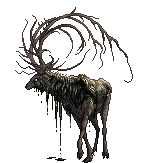Viewing sTb3i

Father: Unknown
Unknown Pedigree
Hardiness: 2
Appearance: 9
Emerged: 11:20 31.10.2023
Matured: 13:01 02.11.2023
Under the light of the moon and amongst the loosely gathered trees is the best time and place to catch a glimpse of the elusive Gudra Kornaro. These massive creatures are often smelled long before they are seen on account of the thick, sticky, foul-smelling sweat that oozes from glands along their back. This substance, referred to as "tar," is their greatest defense, since it tastes even worse than it smells. While impressive in their size and intricacy, a Gudra Kornaro’s antlers are more for show than combat, as they are heavy and fragile. Because of this, Gudra Kornaros move slowly and deliberately as they feast on the foliage of the forest. Gudra Kornaros are solitary, with territories being marked with tar smeared across trees, rocks, and other natural features. During the fall mating season, individuals will call out in search of a mate—a sound best described as a mournful whistle. Though Gudra Kornaros do call to one another outside of mating season, it is rare and generally happens on exceptionally dark nights.
The creatures that dwell in this rather desolate world still display some diversity in appearance, eating habits, and social behavior. Whether they have fur or feathers, skin or scales, their unique genetic makeup allows for a variety of colors and markings within each species. Despite limitations in food sources, herbivores, omnivores, and carnivores are all present in the food chain, and each species requires specialized care within a laboratory. Although the artificial setting of housing units and breeding pods precludes most opportunities to study true interspecific behavior, the interactions within and between species has been studied extensively in the wilderness by scientists daring enough to venture beyond the outpost’s walls.
